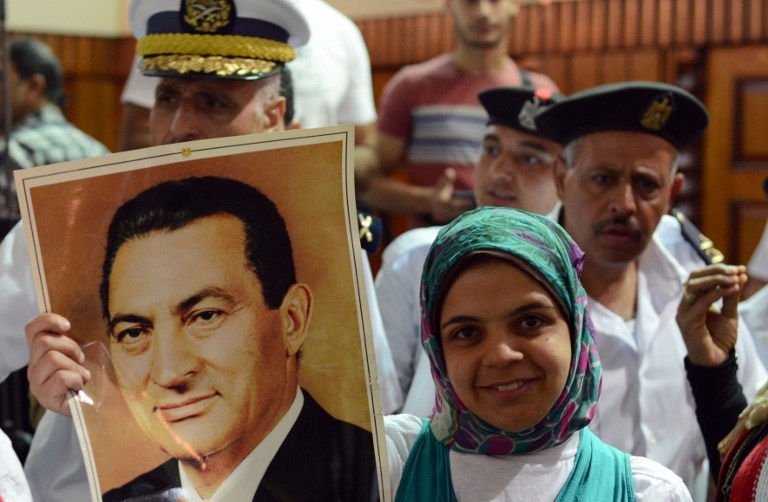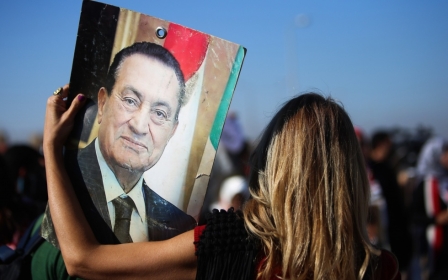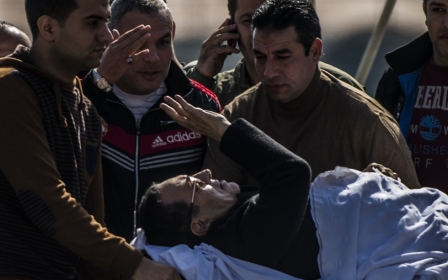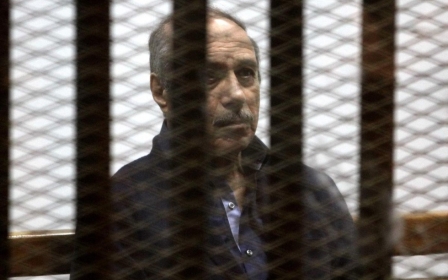Egypt's Mubarak sentenced to three years in prison for corruption

Egypt’s deposed leader Hosni Mubarak and his two sons were sentenced on Saturday to three years in prison and a fine worth $16mn in a retrial on corruption charges.
It wasn’t immediately clear whether their sentence will include time they have already served since the country’s 2011 revolt.
Egypt’s Court of Cassation can still decide to accept or reject an appeal by the general prosecution on 4 June.
The corruption case - dubbed by the Egyptian media as the “presidential palaces” affair - involves charges that Mubarak and his two sons embezzled millions of dollars’ worth of state funds over the course of a decade.
In May 2014, he received a three-year prison sentence while his sons, Gamal and Alaa, received four-year sentences after the trio were found guilty of forging official documents and taking public funds for the maintenance of presidential palaces.
The funds were instead allegedly spent on upgrading the family’s private residences.
In January, however, Egypt's Court of Cassation - the country's highest appellate court - accepted a complaint filed by Mubarak's lawyers, overturned the conviction and ordered a retrial.
It wasn't the first of Mubarak's court cases to be thrown out: in November, the court tossed out a case in which the deposed autocrat was accused of complicity in murdering protesters during the January 2011 protests that led to his downfall.
Several hundred demonstrators rushed to Tahrir Square to protest the verdict, but over 70 protesters were arrested for "illegal protesting" according to the new protest law, while two died as police attempted to disperse the protesters.
In the same month, Mubarak was also cleared of two other corruption charges which included accusations against the then president for exporting natural gas to Israel at below market prices.
Mubarak served preventative detention from April 2011 to August 2013, and then was transferred to the Maadi military hospital where he remains under house arrest.
According to Egyptian law, preventative detention is counted as time served towards any possible sentence.
Acting as free men
Although Mubarak and his sons have only recently been cleared of the charges related to the killing of protesters and the other corruption charges, Egyptian online website Ahram reports that the three have already been acting as free men.
Last month, Ahram reported, Alaa and Gamal Mubarak made their first public appearance since their prison release, attending the funeral of the mother of journalist Mostafa Bakry, once a strong critic of their father's government.
Hosni Mubarak, speaking on Sada El-Balad private TV channel on the 33rd anniversary of Sinai's liberation, discussed his role in expelling Israeli forces from the Peninsula.
During the same interview, he called on Egyptians to “stand behind” President Abdel-Fattah al-Sisi as he has some “fateful decisions to be taken”.
Last week, Ahram reported, photos surfaced of Gamal Mubarak, along with his wife and daughter, on a family outing to Giza’s pyramids.
On his 87th birthday on 4 May, Mubarak waved to dozens of his fans, who had reportedly gathered to chant and hold up his photos, from a window of Maadi military hospital.
New MEE newsletter: Jerusalem Dispatch
Sign up to get the latest insights and analysis on Israel-Palestine, alongside Turkey Unpacked and other MEE newsletters
Middle East Eye delivers independent and unrivalled coverage and analysis of the Middle East, North Africa and beyond. To learn more about republishing this content and the associated fees, please fill out this form. More about MEE can be found here.




